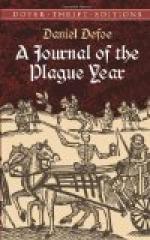“But,” said I, “why do you not come at them? How can you abandon your own flesh and blood?”—“O sir!” says he, “the Lord forbid! I do not abandon them, I work for them as much as I am able; and, blessed be the Lord! I keep them from want.” And with that I observed he lifted up his eyes to heaven with a countenance that presently told me I had happened on a man that was no hypocrite, but a serious, religious, good man; and his ejaculation was an expression of thankfulness, that, in such a condition as he was in, he should be able to say his family did not want. “Well,” says I, “honest man, that is a great mercy, as things go now with the poor. But how do you live, then, and how are you kept from the dreadful calamity that is now upon us all?”—“Why, sir,” says he, “I am a waterman, and there is my boat,” says he, “and the boat serves me for a house; I work in it in the day, and I sleep in it in the night: and what I get I lay it down upon that stone,” says he, showing me a broad stone on the other side of the street, a good way from his house; “and then,” says he, “I halloo and call to them till I make them hear, and they come and fetch it.”
“Well, friend,” says I, “but how can you get money as a waterman? Does anybody go by water these times?”—“Yes, sir,” says he, “in the way I am employed there does. Do you see there,” says he, “five ships lie at anchor?” pointing down the river a good way below the town; “and do you see,” says he, “eight or ten ships lie at the chain there, and at anchor yonder?” pointing above the town. “All those ships have families on board, of their merchants and owners, and such like, who have locked themselves up and live on board, close shut in, for fear of the infection; and I tend on them to fetch things for them, carry letters, and do what is absolutely necessary, that they may not be obliged to come on shore. And every night I fasten my boat on board one of the ship’s boats, and there I sleep by myself, and, blessed be God! I am preserved hitherto.”




